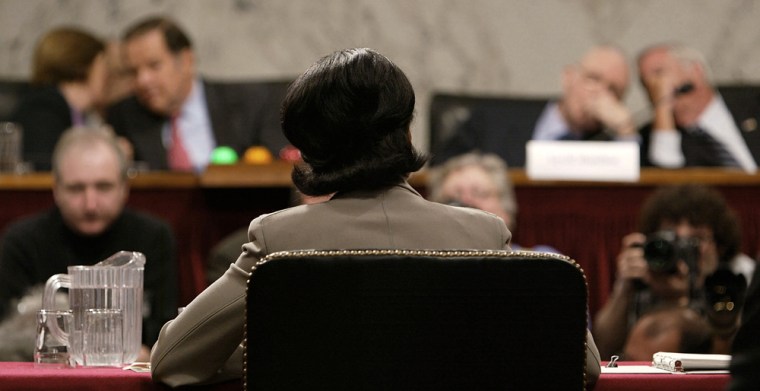Republicans who'd been hoping that Condi Rice would calm the political waters with her testimony to the 9/11 commission have to be disappointed. Stylistically and tactically, she was serviceable. Her voice seemed to quaver at times, but overall she was a confident master of detail, choosing, for the most part, to praise rather than confront the accusatory Richard Clarke. But the larger picture she painted of herself, her president and the administration certainly won't help George W. Bush's re-election chances.
A self-proclaimed expert at understanding "structural" change in large institutions, Rice wasn't aware — may still not be aware — that the nature of her job had changed by the time she took over as national security adviser in January 2001. Reared in the Cold War era, she saw herself following in the footsteps of Henry Kissinger. "National security" was largely a matter of global state-to-state diplomacy.
In fact, as her predecessor in effect warned her when he was turning over the keys, the model was no longer so much Kissinger as it was, say, Elliott Ness or J. Edgar Hoover. If, as she said, we had been at war with terrorism for 20 years; if, as she said, the terrorists are determined to attack America, then the NSC chief has to be a ruthless hunter for clues around the world — and on American soil.
Asked at the hearing why she hadn't pressed the FBI more closely about what it knew, or didn't know, about domestic terrorist threats, she acted as though the question was an odd one: It wasn't her job. Well, in retrospect, it was and now certainly is.
Rice identified the chief "structural" problem — that the CIA and FBI don't share information — in a speech she gave in October 2000. She even said that the problem could result in a disastrous domestic terrorist attack. And yet, based on her own testimony, she did little or nothing before 9/11 to break down those walls. The student of bureaucratic change didn't really attempt to foment any, at least not with the kind of urgency we know she needed to have.
And Rice's tone was perhaps too steely: The response to terrorism over the years had been "insufficient," she said. What a bland word when a soothing sense of regret was required. She was a bureaucrat explaining "structure" to a national audience (and a chamber full of family members) that yearned for blunt talk.
Rice, in the end, is just a cog in a machine. The real political question is: How did her testimony enrich the narrative of what the president did — or didn't — know and do about terrorism before 9/11? In an interview with Bob Woodward, Bush admitted two years ago that he didn't have a sense of "urgency" about al-Qaida. He said he wasn't "on point" — wasn't locked on a target in hunting dog fashion.
That admission caused few ripples when it was published. But now voters may revisit the remark. Why? Because it's now clear that the president may have had urgent reason to be "on point." Rice was told about al-Qaida cells by Richard Clarke in February of 2001. When, if ever, did she tell the president about them? The president was given the now-famous PDB of Aug. 6, 2001, which suggested not only that Osama bin Laden was "determined " to attack inside the United States, but that the FBI had picked up a pattern that suggested the possibility of hijackings here. Did Bush follow up with the FBI? What did he do in the days immediately after getting that PDB? Rice may insist that it wasn't a "warning," but we'll see soon enough when it's released to the public, as it almost surely will be in the days ahead.
The president in the classroom: On vacation?
Remember the picture of the president in the classroom being told by Andy Card of the attack? The American people thought they were seeing a man suddenly thrust into a grave challenge no one could have anticipated. That won him enormous sympathy and patience from the voters. But what if he was literally on vacation — at the ranch in Crawford — when he should have been making sure that someone was ringing alarm bells throughout the bureaucracy?
Already on the defensive for his leadership in the post 9/11 world — the war in Iraq grows less popular by the day — Bush now finds himself with questions to answer about his pre-9/11 leadership. He says he's running for re-election as a "war president." But by Rice's own standards, the war was well under way by the time he took office. He was a "war president" the moment he took the oath. But did he act like one? The election may hinge on the answer.
Howard Fineman is Newsweek’s chief political correspondent and an NBC News analyst.
Does Rice really know her role?
Condoleezza Rice's testimony made one thing clear: She wasn't aware — may still not be aware — that the nature of her job had changed by the time she took over as national security adviser in January 2001.
